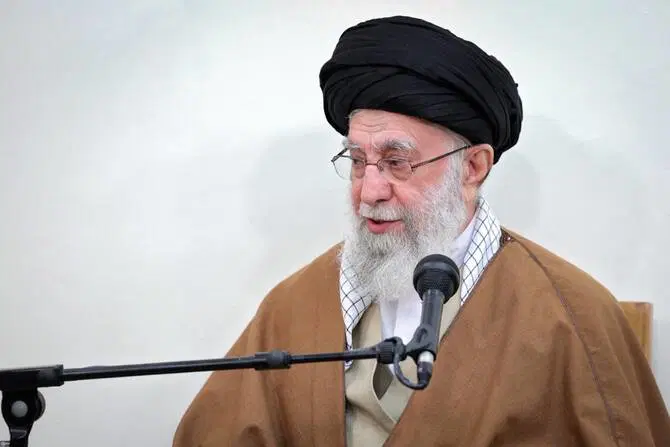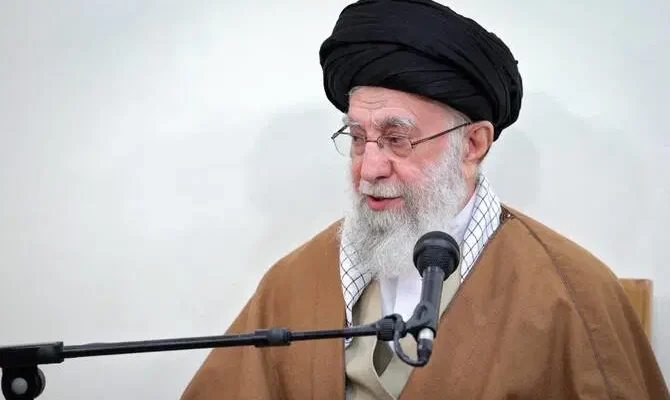
Iran’s Supreme Leader, Ayatollah Ali Khamenei, delivered a defiant speech on Wednesday, declaring that the Islamic Republic would never surrender to the demands of former U.S. President Donald Trump, amid a dangerously escalating military conflict between Iran and Israel. Speaking through a statement aired on state television, Khamenei condemned Trump’s ultimatum as “unacceptable” and warned that any United States military intervention would be met with severe consequences, causing “irreparable damage.”
Khamenei, who has been Iran’s highest authority since 1989 and holds the final word on all state matters, made the comments on the sixth day of a conflict that has seen a dramatic intensification of hostilities between Iran and Israel. The war of words between Tehran and Washington has been matched by an increasingly destructive exchange of military attacks between Iran and Israel, with nuclear facilities, military installations, and urban centers now in the line of fire.
The current crisis erupted on Friday when Israel launched a surprise and extensive bombing campaign targeting Iran’s nuclear infrastructure. The Israeli military confirmed that more than 50 of its fighter jets carried out a coordinated series of air raids in and around Tehran. According to reports from the International Atomic Energy Agency (IAEA), two buildings producing centrifuge components in Karaj, near the capital, were completely destroyed. These centrifuges are vital to uranium enrichment—a process central to both civilian nuclear energy and, when extended, the development of nuclear weapons.
Additionally, another site in Tehran that manufactured and tested advanced centrifuge rotors was also hit. The IAEA noted that the underground enrichment halls at the Natanz nuclear facility appeared to have sustained direct impacts. Israel said the airstrikes were part of its broader effort to prevent Iran from developing nuclear weapons, a goal Iran has consistently denied pursuing.
Iran’s response came swiftly and with force. The Islamic Revolutionary Guard Corps announced it had fired Fattah-1 hypersonic missiles toward Tel Aviv. Though none of the missiles struck their intended targets, Israeli air defense systems were activated across major cities. Night skies over Tel Aviv were lit with bursts of mid-air explosions as defense systems intercepted incoming threats. In addition to missiles, Iran launched a coordinated drone attack, sending a swarm of unmanned aerial vehicles towards Israeli territory. The Israeli military reported intercepting at least 10 drones and said that one of its own surveillance drones had been shot down over Iranian airspace.
As tensions reached new heights, former U.S. President Donald Trump added fuel to the fire with a provocative post on his social media platform, Truth Social. He claimed that the United States knew the exact location of Khamenei and could easily assassinate him. “We know exactly where the so-called ‘Supreme Leader’ is hiding. He is an easy target… but we are not going to take him out — at least not for now,” Trump wrote. The remark sparked widespread concern about potential U.S. involvement. Trump had earlier left the G7 summit in Canada abruptly, raising speculation about a looming American military decision.
Following an emergency meeting with the National Security Council, U.S. officials clarified that no final decision had been made regarding intervention. However, the United States reaffirmed its commitment to Israel’s right to self-defense. Despite international calls for de-escalation, the situation continued to spiral, with both sides showing little interest in backing down.
The human toll of the conflict is growing rapidly. Israeli officials reported that at least 24 citizens had been killed and hundreds injured since the airstrikes began. On the Iranian side, the death toll stood at 224 as of Sunday, according to Tehran, with the figure including high-ranking military commanders, nuclear scientists, and civilians. No updated count had been provided by Iranian authorities at the time of reporting.
In both nations, civilian life has been heavily disrupted. Tel Aviv residents have spent night after night responding to air raid sirens, rushing to bomb shelters as defense systems engage incoming threats. In Tehran, widespread anxiety has led to long lines at bakeries, fuel stations, and supermarkets, with residents stockpiling essential supplies amid fears of further attacks.
Even from outside the main conflict zones, the events have gripped the region. In the West Bank city of Ramallah, some residents gathered on rooftops and balconies to watch the dramatic scenes unfold. According to an AFP journalist, cheers and whistles rang out as Israeli air defenses intercepted missiles overhead, resulting in loud explosions that lit up the night sky.
Meanwhile, Iranian security forces reported a domestic development: the arrest of five individuals accused of being linked to Israel’s Mossad intelligence agency. State news agencies ISNA and Tasnim claimed the suspects were engaged in activities designed to harm Iran’s image online. These arrests reflect growing concern within the Iranian government about internal sabotage and foreign espionage as the country comes under both military and psychological pressure.
The intensifying war has also derailed the fragile diplomatic process aimed at resolving Iran’s nuclear standoff with the West. Talks between Tehran and Washington have now been suspended indefinitely. Iranian officials made it clear that they would not return to the negotiating table while under attack, casting doubt on the future of any potential nuclear agreement.
While Israel has long maintained a policy of strategic ambiguity regarding its own nuclear arsenal, the Stockholm International Peace Research Institute (SIPRI) estimates that the country possesses approximately 90 nuclear warheads. This reality adds a deeply troubling dimension to a conflict already teetering on the edge of full-scale war.
The unfolding crisis marks a dangerous shift from a long-running shadow war between Iran and Israel to open confrontation. With powerful allies on both sides, including the United States, the risk of regional spillover is rising fast. World leaders continue to call for calm, but the drums of war grow louder by the hour.
As the situation develops, the world watches with bated breath, hoping diplomacy can still find a way to pull the region back from the brink.

Comments